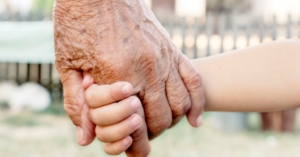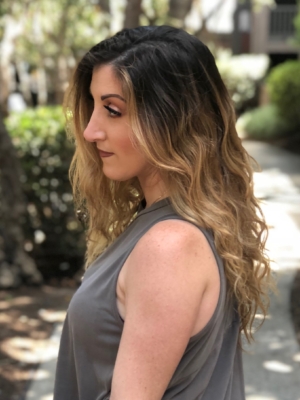Life Is Like A Sauna and I’m Sweatin’ Over Here
My paternal grandmother didn’t appear in my life until I was nine years old. And then one day there she was, all khaki pants and white sneakers, crow’s feet, and grayish blue corrugated lines above her lip. There she was on our front lawn, already an antique. There She Was. Reappear is probably the better description, but since I had no recollection of ever having met her, I didn’t think it counted, mattered even. My father had given her a warning years earlier—if she couldn’t treat my mother with respect, he would cease contact. Mistakes had been made; the kind families make in the name of something greater. But nine years later it had all seemed so small. What had the distance and silence been for, if their nine-year old daughter didn’t know her own grandmother?
Grandma Jean was understandingly a “tough broad,” as they said back in the day. Growing up with an alcoholic father and a mother with chronic health problems, she and her sisters were put into the system at young ages. She’d lost her husband of fifteen years, raised two young boys on her own. She dyed her hair blonde, was a diehard Mets fan, and was known for shouting to neighbors out of her Brooklyn window. A phone call was an afterthought. Perhaps it was because of all this that she wasn’t a warm woman, wasn’t one to give affection. Life’s trials had worn away her softness, had made callous.
When we were reunited, I looked into eyes unlike mine and saw no tenderness. I remember walking the length of my childhood backyard with her, upon our first meeting, dewy grass blades between my bare toes, curious about a link I was told I shared with this woman, yet a stranger all the same. I stared at her when she looked away hoping to scan her face, to learn who she was in the small moments before she’d look back. I learned her middle name was Rose; how could a woman with a delicate flower in her name be so hard-edged, so stoic?
Looking back I wanted my grandmother’s love and acceptance, wanted her to hold me close, to say she’d missed me, that the years that’d been between us had been a mistake—just one moment of vulnerability. But for reasons I’ll never know she could not. I couldn’t understand then, but as a woman with my own life in-progress, I do now. But I didn’t share this with her, not in the rest of the time I knew her.
By the time I was nineteen, Grandma Jean and I still weren’t close. I ended up resentful of her and some of that resentment wasn’t even mine. I was hurt, sure, but mostly mad. Mad for my father, mad for my mother, mad for myself, mad at Grandma Jean for not trying harder to know me, for not trying at all.
And then one day, Grandma Jean saved my life. I was driving to a college math class, singing along to Christina Aguilera’s latest album. There’s a very good chance it was “What a Girl Wants” or “Genie in a Bottle.” The weather in my Connecticut hometown was formidable—gloomy October skies, murders of crows cawing in that ominous way that causes me to crane my neck skyward, sheets of water coming down all morning. It didn’t seem it would let up anytime soon. I was coming up on a dip in the highway, although I didn’t know it, a dip where all those sheets of water had collected, pooled, and formed a small pond. The two-lane section of the highway wasn’t busy that morning, there weren’t any cars in front of me, so when I hit the dip and all its contents, I hydroplaned something fierce. No matter what I attempted to get the car to do, it would not obey. I turned left, it went right; I tried to stop, it spun. A rollercoaster feeling, but the scary kind that does all the flips, goes backwards and forwards, leaving a body to flail at its will. The rest I remember in flashes. FLASH slamming on the brakes in reaction; FLASH the car rotating one hundred and eighty degrees then FLASH slamming into the guardrail, FLASH cars coming at me head-on.
The car finally came to a stop at the bottom of a small hill, backward. It had missed a large tree by less than a foot. The guardrail had been lifted and was now arc-shaped from where my little sports car had somehow gone under, before landing down that hill.
After a shopper at the 7 Eleven across the street called 9-1-1, EMTs had to guide me out of the passenger’s side door since the tree had trapped the driver’s. My parents arrived and held me before I stepped into the ambulance. My injuries were minimal physically, mostly psychological: whiplash, of course, and a significant amount of PTSD for driving in precipitating conditions. Connecticut State Police told my parents that other accidents of that caliber had seen drivers killed; on their watch guardrails had decapitated drivers many times before. And what if I’d slammed into that tree? I’d lucked out, was maybe even granted a miracle.
When we got home from the hospital that afternoon, my dad got a call from his brother. He learned Grandma Jean had died from complications to cancer that morning, right about the time of my accident. In fact, just before my parents were notified of my accident, they’d been preparing to visit in order to say their final goodbyes. I wasn’t the most religious of young women, but even I couldn’t deny the coincidence of that timing. I turned the freakish timing over and over in my mind that night, on the verge of connecting the dots, not quite ready to assign meaning to the event that had saved my life.
Her funeral was a week later. An extended family member was in the pulpit, eulogizing my grandmother when a feeling came over me. Heat radiated through my body, and I clutched the pew beneath me. I unexpectedly began crying. My religious family members would tell me it was the Holy Spirit, but I felt differently. I realized in that moment I’d forgiven Grandma Jean; her sins, in my eyes, purified. Viscerally, my body had registered the act of forgiveness. In the ten years I’d known Grandma Jean there’d been a distance between us, and I knew in that moment I had to own up to my part of that distance, the arm’s length I kept there after we’d met. While I was glad I was finally able to forgive in that moment, it took my horrific experience and my grandmother’s death for me to absolve her, to purify her sins. I was glad for it, but I wonder now why I couldn’t have learned my lesson while she was still here, saved some time for us both?
* * *
I see a sauna in my mind’s eye. I’m in the sauna, but it’s me from my life before Coronavirus. I look unbearably hot; my skin is red, irritated, beads of sweat drip from my eyebrows, blocking my vision and I wipe and wipe and wipe at them, but they never stop dripping. Thing is, in this image, I have no idea I’m unbearably hot. Why couldn’t I feel the heat?
This was my life pre-Coronavirus. Life’s distractions had me in such a rush. I have to get in the car, I don’t have time for this; I have to squeeze in writing this chapter, I don’t have the time; I have to hurry up and go to bed, there isn’t enough time; I have to get in the shower, where did the time go?
 All those distractions didn’t allow me to feel the steam, and I struggled to realize how unbearable it was. I’m still in that same sauna now. But Post-Coronavirus I’m able to feel the heat, the accrued steam registers, now I notice the beads of sweat that obscure my view. It took shutting down the bulk of society to purify me from everything that had blinded me.
All those distractions didn’t allow me to feel the steam, and I struggled to realize how unbearable it was. I’m still in that same sauna now. But Post-Coronavirus I’m able to feel the heat, the accrued steam registers, now I notice the beads of sweat that obscure my view. It took shutting down the bulk of society to purify me from everything that had blinded me.
All these years later, I forgot the lesson I’d learned from forgiving Grandma Jean. Life got in the way, go figure. I want the purification this virus has given me to endure, to stay with me when I go back to whatever normal is in store for us all. This is a lesson I hope I don’t have to learn again. There can be no going back to my old life, and instead of mourning this I want to embrace it, and launch myself into the future.
Lisa Croce is a writer of novels and short stories living in Los Angeles. She received her B.A. in Creative Writing at AULA and will graduate with her MFA in Fiction from Antioch in June. She is the Web Manager and a blogger for Lunch Ticket. She’s using this time to finish revising her manuscript, and it has finally become a joy.





